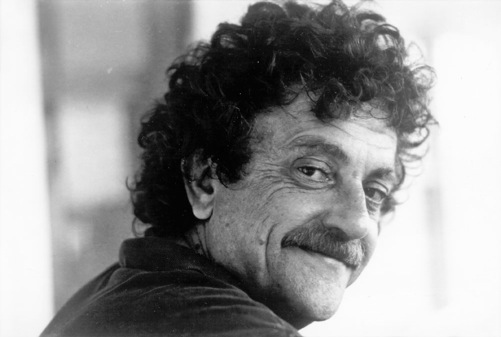
"I have been a soreheaded occupant of a file drawer labeled 'science fiction' ever since, and I would like out, particularly since so many serious critics regularly mistake the drawer for a urinal."
--Kurt Vonnegut (1922-2007)

Family Life:
Kurt Vonnegut, Jr., son of Kurt and Edith Vonnegut, was born on November 11, 1922, in Indianapolis, IN. He had an older brother named Bernard and an older sister named Alice. Vonnegut married Jane Marie Cox in 1945 and divorced in 1979. At this time, he remarried Jill Krementz. Vonnegut had three biological children from his first marriage: Mark, Edith, and Nanette. He also adopted his sister's children after her death: James, Steven, and Kurt Adams. He adopted a daughter, Lili, during his second marriage. Vonnegut died at the age of 84 in April 2007.
Education:
Vonnegut attended Cornell University, where he was a member of the Delta Upsilon fraternity. He later attended the Carnegie Institute of Technology and the Universty of Tennessee to study mechanical engineering. He later received his graduate degree at the University of Chicago in anthropology.
War Life:
Vonnegut enlisted in the army during his time at Cornell. He served abroad in Germany, where he was captured as a POW in 1944. He was imprisoned in Dresden where he witnessed the firebombing of Dresden in 1945. Kept underground in a slaughterhouse, Vonnegut referred to this experience in several of his novels, including Slaughterhouse Five, as his actual prison camp was called. Vonnegut was freed in May 1945 and received a Purple Heart.
Writing:
Cat's Cradle was Vonnegut's first bestseller, though Slaughterhouse Five later became his most famous work. Many of his works included scientific elements, but they were reviewed and read beyond the science fiction genre. Vonnegut objected to being classified as a science fiction writer, partially because the genre was not largely considered as respectable. Though some science fiction is of a higher quality, Vonnegut states that a great deal of it is trash. He also claims that science fiction is a "joining" community, as basic as any number of fraternal organizations.